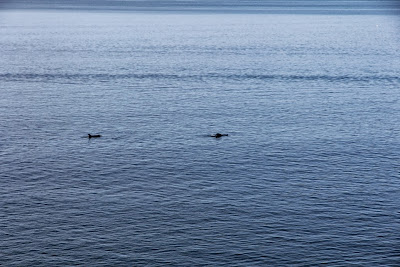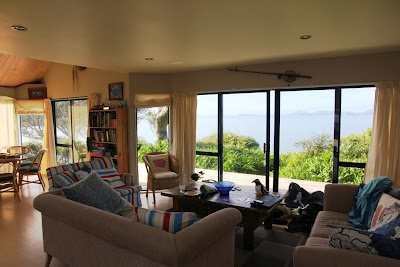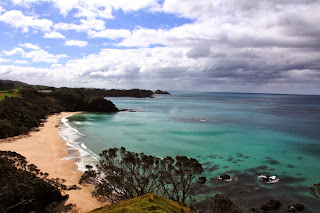6 October 2013
We stayed the last couple of days of our holiday at a family friends batch at Whangaumu Bay near Tutukaka, another great spot with lots to do. We did a few walks, went fishing, kayaking (with bottlenose dolphins), and snorkelling.
We did the Tutukaka Headland walk a nice 1hr return track across a small beach and through some native bush. Dont go at high tide as the beach in the middle disappears.
At the end of the headland there were some great views of the tutukaka coast. This is looking out to Te Waite Bay and Rahomauno Island where we kayaked to one day.
The lighthouse
Tutukaka harbour
Looking across Whangaumu Bay
Sunset over the Ngunguru Estuary. There is a nice walk around the rocks at low tide to Ngunguru township.
There were bottlenose dolphins playing in the bay and when we went out kayaking around the coast they followed us for a good half hour. Its amazing to see them up close jumping beside us and swimming right under our kayaks.
New Zealand wood pigeon
Sunset over Whangaumu Bay after catching a snapper for tea in the Bay.
A really nice relaxing spot to stay
Karens keeping herself entertained with a 1000 piece wazjig puzzle
We stopped by the Whangerei falls on the way home
They are really nice falls with a loop walk through some bush
Diving the Poor Knights
3 October 2012
Next stop was Tutukaka and Whangaumu Bay. Diving the Poor Knights is something we have wanted to do for years and today we picked the perfect day to get out there and do it. We had two dives at Northern arch and Blue Maomao arch as well as a tiki tour through the arches and around the islands which make up the Poor Knights island group.
We left from tutukaka for the hour ride out to the islands
The poor knights island group. It is meant to look like a knight lying down.
Our first stop was Northern arch
We saw there are hundreds of blue and pink maomao throughout the arch with a few colourful nudibranchs and massive scorpion fish (granddaddy hapuka). The famous northern arch is where stinkrays used to congregate in there hundreds in the arch just floating around until some orcas found them and ripped them all to pieces a few years back.
Colourful nudibranchs at northern arch. these tropical species thrive here due to the warm waters the come down here from the south pacific.
One of many scorpion fish we almost put our hands on everytime we touched the wall.
The arch is on the northern end of the biggest island - Tawhiti Rahi Island. The entire island group is a marine reserve which means no landing. With these steep rouged cliffs I dont know how you would even if you wanted to.
Everyone was trying to convince me there was a face shaped in the rock
We used dive tutukaka as their boats are the only ones that go out daily
Middle Arch. Another of many arches through the islands
There were schools of trevally feeding on krill at the surface throughout the day
The worlds largest sea cave Rikoriko - apparently they have big concents in here because of the amazing acoustics
A seal bathing in the sun on the rocks
The northern end of Aorangi Island which was once occupied by a Maori tribe.
Getting our gear ready for a dive
Blue Maomao arch was a shallower dive where you see thousands of fish going in and out of the archway for protection from predators. We had really good visibility with 70minutes down time.
Karen and I in the archway. The different shades of light and various tunnels and and parts to the archway were really trippy and we werent disappointed with the fish as they were everywhere.
This salp mass was a rare find. Apparently for only a couple of weeks at this time of the year nowhere else in the world salps all congregated together form these large tubes which can be a few metres long.
Big school of blue maomao and colourful wrasse
Nudibranch at blue maomao arch
Archway through the middle of Aorangaia Island
Southern arch - the largest arch in the southern hemisphere
We spotted this large sunfish on the way back to tutukaka.
Next stop was Tutukaka and Whangaumu Bay. Diving the Poor Knights is something we have wanted to do for years and today we picked the perfect day to get out there and do it. We had two dives at Northern arch and Blue Maomao arch as well as a tiki tour through the arches and around the islands which make up the Poor Knights island group.
We left from tutukaka for the hour ride out to the islands
The poor knights island group. It is meant to look like a knight lying down.
Our first stop was Northern arch
We saw there are hundreds of blue and pink maomao throughout the arch with a few colourful nudibranchs and massive scorpion fish (granddaddy hapuka). The famous northern arch is where stinkrays used to congregate in there hundreds in the arch just floating around until some orcas found them and ripped them all to pieces a few years back.
Colourful nudibranchs at northern arch. these tropical species thrive here due to the warm waters the come down here from the south pacific.
One of many scorpion fish we almost put our hands on everytime we touched the wall.
The arch is on the northern end of the biggest island - Tawhiti Rahi Island. The entire island group is a marine reserve which means no landing. With these steep rouged cliffs I dont know how you would even if you wanted to.
Everyone was trying to convince me there was a face shaped in the rock
We used dive tutukaka as their boats are the only ones that go out daily
Middle Arch. Another of many arches through the islands
There were schools of trevally feeding on krill at the surface throughout the day
The worlds largest sea cave Rikoriko - apparently they have big concents in here because of the amazing acoustics
A seal bathing in the sun on the rocks
The northern end of Aorangi Island which was once occupied by a Maori tribe.
Getting our gear ready for a dive
Blue Maomao arch was a shallower dive where you see thousands of fish going in and out of the archway for protection from predators. We had really good visibility with 70minutes down time.
Karen and I in the archway. The different shades of light and various tunnels and and parts to the archway were really trippy and we werent disappointed with the fish as they were everywhere.
This salp mass was a rare find. Apparently for only a couple of weeks at this time of the year nowhere else in the world salps all congregated together form these large tubes which can be a few metres long.
Big school of blue maomao and colourful wrasse
Nudibranch at blue maomao arch
Archway through the middle of Aorangaia Island
Southern arch - the largest arch in the southern hemisphere
We spotted this large sunfish on the way back to tutukaka.
Whananaki
2 October 2013
We made the most of the school holidays and headed up north to Whananaki and Tutukaka. We stayed in Whananaki at a farm where I used to go on holiday as a kid and with the camping season only just opening the day before we arrived we were rewarded by having the entire farm to ourselves. We stayed two nights at Kings Beach and then another two nights at Barons Beach both fantastic beaches. We had an awesome few days camping and exploring the coastline, kayaking, snorkelling, horse riding, fishing and relaxing in this neat spot.
Enjoying the luxury camping at Kings beach - a beautiful surf beach with white sand, pohutukawas, and all to ourselves :-)
There were a pair of dotterels on the beach getting ready to nest and lots of red billed gulls .
We went for a big walk exploring the Motutara Reserve Peninsula
We used to camp in this valley when we were kids. It all looks a little smaller visiting this area 15 years later.
The estuary
We walked across the Whananaki walk bridge - the longest footbridge in the southern hemisphere at 350m long.
Barons Beach
We went for a kayak down to Otamure DOC camp, fishing at elizabeth reef, and snorkelling everywhere (even saw a seal).
Whananaki by night at Barons Beach. There was luminecense in the water and a sky full of stars being away from those city lights.
We went offroad horseriding. We took a rough path through a bit of forest then knee deep high with water into the estuary where we walked out to the main beach.
Great view up the estuary
Threatened Brown teal make the Whananaki estuary their home.
We made the most of the school holidays and headed up north to Whananaki and Tutukaka. We stayed in Whananaki at a farm where I used to go on holiday as a kid and with the camping season only just opening the day before we arrived we were rewarded by having the entire farm to ourselves. We stayed two nights at Kings Beach and then another two nights at Barons Beach both fantastic beaches. We had an awesome few days camping and exploring the coastline, kayaking, snorkelling, horse riding, fishing and relaxing in this neat spot.
Enjoying the luxury camping at Kings beach - a beautiful surf beach with white sand, pohutukawas, and all to ourselves :-)
There were a pair of dotterels on the beach getting ready to nest and lots of red billed gulls .
We went for a big walk exploring the Motutara Reserve Peninsula
We used to camp in this valley when we were kids. It all looks a little smaller visiting this area 15 years later.
The estuary
We walked across the Whananaki walk bridge - the longest footbridge in the southern hemisphere at 350m long.
Barons Beach
We went for a kayak down to Otamure DOC camp, fishing at elizabeth reef, and snorkelling everywhere (even saw a seal).
Whananaki by night at Barons Beach. There was luminecense in the water and a sky full of stars being away from those city lights.
We went offroad horseriding. We took a rough path through a bit of forest then knee deep high with water into the estuary where we walked out to the main beach.
Great view up the estuary
Threatened Brown teal make the Whananaki estuary their home.
Subscribe to:
Posts (Atom)











































































